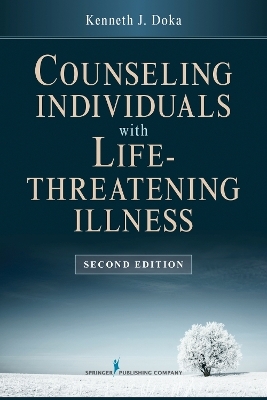
Counseling Individuals with Life-Threatening Illness
Springer Publishing Co Inc (Verlag)
978-0-8261-9581-4 (ISBN)
Comprehensive and practical, the book presents useful strategies for counsellors and health care professionals to use with gravely ill individuals in every stage of the life cycle. The book delineates specific tasks for patients to perform and describes issues that must be addressed by patients and their families. It also describes new therapies that have been developed to assist patients in gaining understanding, dignity, and acceptance during this final phase of their lives. Additionally, the book addresses pain management, anticipatory mourning, and caregiver stress and presents effective strategies, best practices, and resources for counsellors to use with individuals during each phase of their illness.
New to this edition:
Generational differences as a source of diversity
Expanded sections involving meaning-making strategies (dignity enhancement therapy, living eulogies, reminiscence therapy, life review, meaning-centred therapy, moral ethical, and heart wills)
Discussion of end-of-life phenomena and ways to assist patient and family in interpreting and responding to them
Enhanced coverage of caregiver issues
Expanded discussion of spirituality
Additional behavioural strategies to assist pain management
Anticipatory mourning
Post-death grief for family members
Chronic care and rehabilitation
Incorporates Rand Study on Concurrent Care and other new models
Kenneth J. Doka, PhD, is Professor of Gerontology at the Graduate School of The College of New Rochelle and Senior Consultant to the Hospice Foundation of America, USA. A prolific author, Dr. Doka's books include Spirituality and End-of-Life Care, Grieving Beyond Gender, Pain Management at the End-of-Life: Bridging the Gap between Knowledge and Practice, Living with Grief Series; Men Don't Cry, Women Do: Transcending Gender Stereotypes of Grief; Disenfranchised Grief: Recognizing Hidden Sorrow: Living with Life Threatening Illness; Children Mourning, Mourning Children; Caregiving and Loss: Family Needs, Professional Responses; AIDS, Fear and Society; Aging and Developmental Disabilities; and Disenfranchised Grief: New Directions, Challenges, and Strategies for Practice. In addition to these books, he has published over 60 article and book chapters, and is the Editor of Omega: Journal of Death and Dying, and Journeys: A Newsletter to Help in Bereavement. Dr. Doka has served as President of the Association for Death Education and Counseling, and on the Board of Directors and as Chair of the International Group of Dying, Death and Bereavement. He is the recipient of The Association for Death Education and Counseling Award for Outstanding Contributions in the Field of Death Education. He has lectured widely throughout North America, Europe, Asia, and Australia and participates in the annual Hospice Foundation of America Teleconference, hosted by Cokie Roberts, and has appeared on CNN, and Nightline, among other outstanding achievements.
Chapter 1 – Introduction
Chapter 2 – Historical Perspectives on Illness
Chapter 3 – Reacting and Adapting to Illness
Chapter 4 – A Model of the Illness Experience
Chapter 5 – The Prediagnostic and Diagnostic Phases
Chapter 6 – The Chronic Phase
Chapter 7 – The Recovery Phase
Chapter 8 – The Terminal Phase
Chapter 9 – Illness and the Family
Chapter 10 – The Professional Caregiver
Index
| Zusatzinfo | 2 illustrations |
|---|---|
| Verlagsort | New York |
| Sprache | englisch |
| Gewicht | 455 g |
| Themenwelt | Geisteswissenschaften ► Psychologie ► Trennung / Trauer |
| Medizin / Pharmazie ► Medizinische Fachgebiete ► Intensivmedizin | |
| Medizin / Pharmazie ► Medizinische Fachgebiete ► Psychiatrie / Psychotherapie | |
| Medizin / Pharmazie ► Physiotherapie / Ergotherapie ► Rehabilitation | |
| Sozialwissenschaften ► Soziologie | |
| ISBN-10 | 0-8261-9581-4 / 0826195814 |
| ISBN-13 | 978-0-8261-9581-4 / 9780826195814 |
| Zustand | Neuware |
| Informationen gemäß Produktsicherheitsverordnung (GPSR) | |
| Haben Sie eine Frage zum Produkt? |
aus dem Bereich


